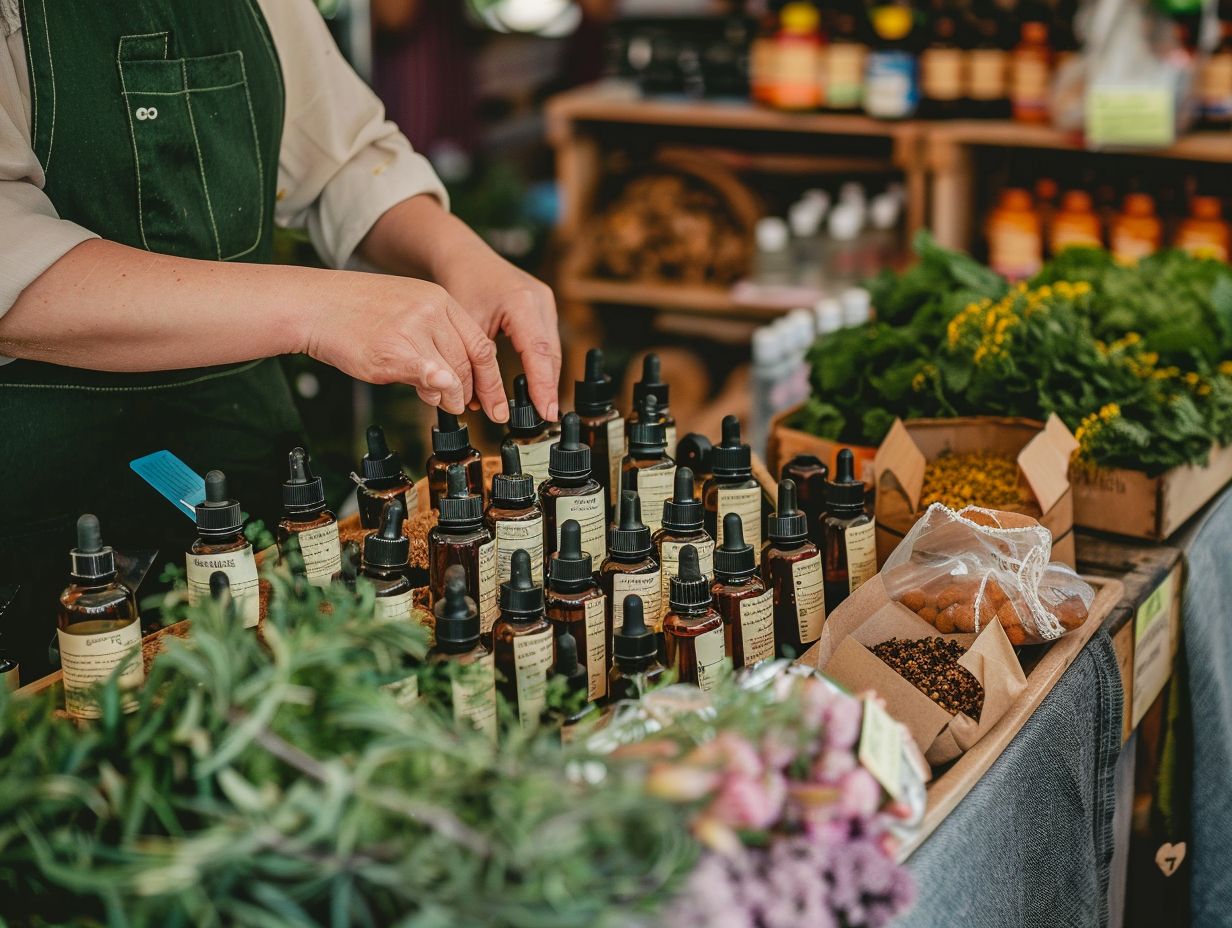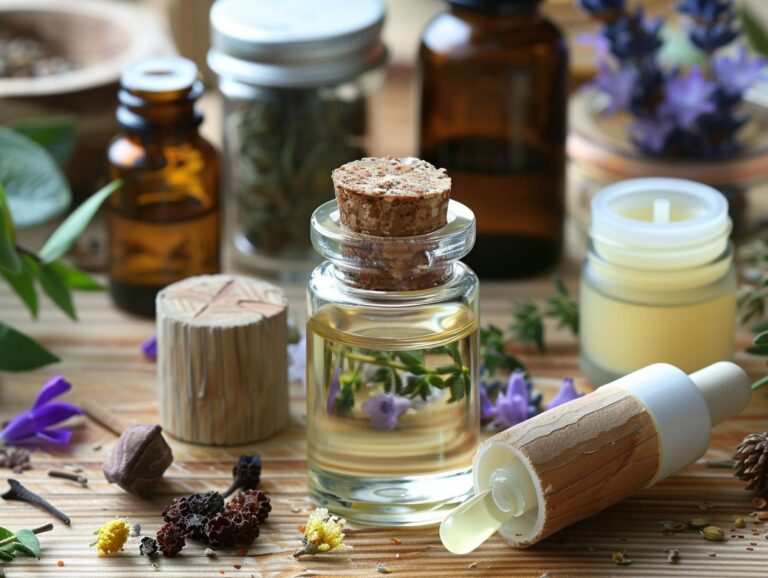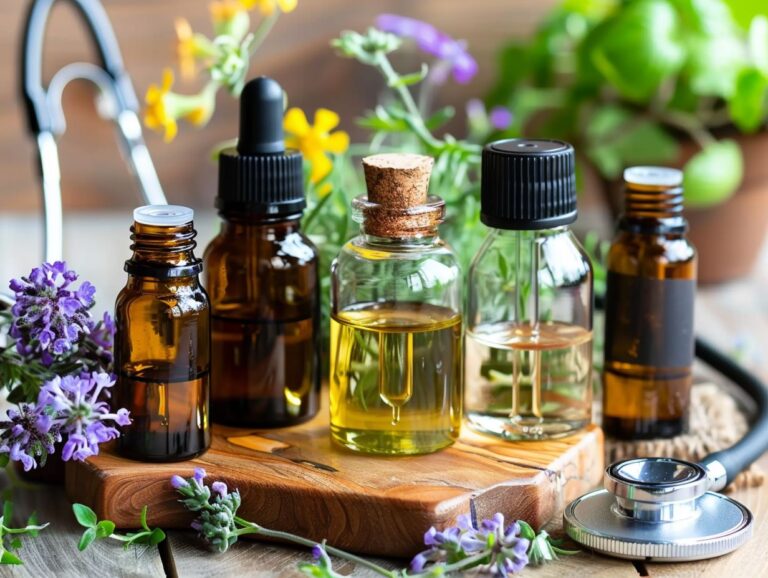Do You Need a License to Sell Essential Oils
Curious about the world of essential oils? Wondering how to use them and what benefits they offer? In this comprehensive article, we’ll explore everything you need to know about essential oils, from their uses in aromatherapy and skincare to their potential for stress relief.
We’ll also delve into the legal requirements for selling essential oils, including licensing, regulations, safety precautions, and more.
So sit back, relax, and let’s dive into the fascinating world of essential oils together!
Key Takeaways:
What Are Essential Oils?
Essential oils are concentrated liquids containing volatile aroma compounds from plants. They are typically extracted through distillation, a process that captures the essence of the plant’s fragrance and properties.
These oils can be extracted from a variety of plant parts such as flowers, leaves, bark, roots, and seeds, each imparting a unique set of therapeutic benefits. The quality of essential oils greatly depends on factors like the plant species used, cultivation methods, extraction techniques, and storage conditions.
High-quality oils, obtained from reputable sources, ensure purity and potency, making them suitable for a wide range of applications. From aromatherapy and skincare to culinary and pharmaceutical industries, essential oils play a vital role in enhancing physical, emotional, and mental well-being.
How Are Essential Oils Used?
Essential oils can be used in a variety of ways, including aromatherapy, skincare products, and as natural remedies. They are commonly packaged in glass bottles to preserve their potency and purity.
Diffusion is one popular method of utilizing essential oils. This involves using a diffuser to disperse the oils into the air, allowing the molecules to be inhaled for their therapeutic benefits.
Topical application, on the other hand, entails diluting the oil with a carrier oil before applying it to the skin.
Ingestion, though effective, should be approached with caution and only under the guidance of a trained professional. Proper packaging and labeling are crucial for essential oil products to ensure accurate usage instructions and to maintain their quality over time. It is important to store these oils in dark-colored glass bottles away from direct sunlight to avoid degradation.
What Are the Benefits of Essential Oils?
Essential oils offer a wide range of benefits, including aromatherapy for mental well-being, skincare for healthy complexion, and stress relief for relaxation and peace of mind. These natural extracts have gained popularity for their holistic healing properties.
Aromatherapy
Aromatherapy is the practice of using essential oils to enhance psychological and physical well-being. The National Association for Holistic Aromatherapy (NAHA) has established guidelines and standards for the safe and effective use of essential oils in aromatherapy.
Essential oils have been known to provide various therapeutic benefits, such as stress relief, mood enhancement, and improved sleep quality. When practicing aromatherapy, it is important to consider the different relaxation techniques that can be utilized, including inhalation, massage, and baths. Diffuser blends are popular choices for dispersing the soothing scents of essential oils into the air, creating a calming atmosphere in your living or work space.
Skin Care
Essential oils are widely used in skincare products for their natural healing and rejuvenating properties. Companies like J Taylor Publishing have introduced innovative formulations that harness the benefits of essential oils for healthy skin.
These potent oils are packed with a plethora of skin-loving properties, ranging from anti-inflammatory and antimicrobial to antioxidant and soothing qualities. Depending on your skin type and concerns, certain essential oils can work wonders for your complexion. For oily skin, tea tree oil is a popular choice due to its ability to combat acne-causing bacteria. On the other hand, those with dry skin may benefit from the moisturizing effects of lavender oil. For sensitive skin, gentle options like chamomile oil can help calm irritation and redness.
Stress Relief

These essential oil blends often include lavender, known for its soothing properties, and chamomile, which promotes relaxation. When these oils are diffused or applied topically, their aromatic compounds can trigger responses in the brain that help reduce anxiety and improve overall well-being.
Studies have shown that certain essential oils like lemon and peppermint can enhance mental clarity and focus, making them ideal for times when you need to re-energize and regain concentration.
Do You Need a License to Sell Essential Oils?
Selling essential oils as a business may require obtaining specific licenses and permits depending on the regulations of your location. The licensing process for selling essential oils involves compliance with legal requirements and quality standards.
Research the regulations set by relevant authorities for selling essential oils in your area. Contact the local business licensing department to inquire about the specific licenses needed. Once you have a clear understanding of the requirements, proceed with filling out the necessary forms and applications for the permits.
Quality control measures are vital in the essential oils industry. Ensure that your products meet the specified standards and undergo testing for purity and potency. This may involve working with certified labs for analysis and documentation.
Compliance with industry regulations is crucial for maintaining the legality of your essential oils business. Keep detailed records of your production processes, sources of ingredients, and any certifications or licenses obtained.
What Are the Regulations for Selling Essential Oils?
The sale of essential oils is subject to regulations set by authorities like the U.S. Food and Drug Administration (FDA) to ensure consumer safety and product quality. Compliance with labeling requirements and purity standards is essential for legal selling.
Understanding and adhering to FDA guidelines is crucial in navigating the regulatory landscape for essential oils. The FDA requires clear and accurate labeling, including proper identification of ingredients and potential allergens. Quality control measures such as ensuring the oils are pure and free from contaminants are paramount. To maintain legal compliance, businesses must stay updated on any changes in regulations and conduct thorough testing to meet industry standards. By following these protocols, companies can build trust with consumers and establish a reputable presence in the competitive essential oils market.
Do You Need a Special License for Selling Essential Oils Online?
Selling essential oils online may require specific licenses and permits, as regulated by authorities such as the U.S. Small Business Administration. Online sales entail additional considerations for licensing and compliance with e-commerce regulations.
When venturing into the online market, it is crucial to understand the intricacies involved in acquiring the necessary licenses. E-commerce platforms often have their set of guidelines for sellers, necessitating compliance with their terms and conditions. Digital marketing strategies also play a significant role in promoting essential oils online, but it is essential to ensure that all advertising practices align with industry regulations.
Efficient fulfillment processes are vital to maintaining customer satisfaction. From packaging to shipping, each step must adhere to legal standards to avoid potential complications. Understanding the legal aspects of online retailing in the industry is essential for a successful and compliant operation.”
What Are the Safety Precautions for Selling Essential Oils?
Ensuring the safety of essential oils involves proper labeling, dilution guidelines, and appropriate storage and handling practices.
Accurate labeling is imperative to provide customers with clear information about the contents and usage instructions. Properly labeled bottles indicate the exact botanical name of the oil, country of origin, batch number, and expiration date.
Recommended dilution ratios vary for each essential oil and application, so sellers should provide dilution guidelines based on the intended use. Diluting essential oils properly ensures that users avoid skin irritation or adverse reactions.
Storage tips play a central role in preserving the oils’ efficacy and shelf life. It’s essential to keep oils away from direct sunlight, heat sources, and fluctuations in temperature to prevent degradation. Using dark-colored glass bottles and storing them in a cool, dark place can help extend their shelf life.
Proper Labeling
Proper labeling of essential oil products is required by regulatory bodies like the State of California to provide consumers with essential information on usage, ingredients, and potential allergens. Compliance with labeling regulations is a legal requirement for selling essential oils.
Accurate product labeling not only ensures compliance with the law but also helps build trust with consumers. Consumers rely on labels to make informed decisions about the products they purchase, especially when it comes to items like essential oils that are used for health and wellness purposes. Transparent labeling practices foster transparency and credibility, demonstrating the commitment of the company to consumer safety and satisfaction.
Dilution Guidelines

Following dilution guidelines is crucial when using essential oils in products to ensure the safety and well-being of consumers.
Platforms like Etsy emphasize the importance of proper dilution practices for homemade essential oil blends. Dilution ratios play a key role in determining the concentration of essential oils in a final product. Most experts recommend using a 2-3% dilution ratio for general topical applications, meaning 2-3 drops of essential oil per teaspoon of carrier oil. Carrier oils, such as jojoba, coconut, or sweet almond oil, are commonly used to dilute essential oils, helping to reduce skin irritation and enhance absorption.
Storage and Handling
Proper storage and handling of essential oils are essential to maintain their potency and quality over time.
Platforms such as Amazon provide valuable insights into ensuring the longevity and efficacy of essential oils. Storing oils in dark glass bottles shields them from light exposure, a key factor in preventing oxidation and degradation. Placing the bottles in a cool, dry place further safeguards the oils against heat, which can accelerate the breakdown process. Tightly sealing the bottles helps prevent contamination and oxidation, preserving the purity and therapeutic properties of the oils.
What Are the Legal Requirements for Selling Essential Oils?
The legal requirements for selling essential oils involve business registration, tax obligations, and insurance coverage to operate within the legal framework. Manufacturers must comply with industry regulations to ensure product safety and consumer protection.
Businesses entering the essential oils market must be aware of the specific laws and regulations governing the production and sale of these products. In most countries, businesses need to register their operations with the appropriate government agencies and comply with health and safety standards set by regulatory bodies.
Regarding taxes, companies selling essential oils are typically required to pay sales tax on their transactions. It is crucial to keep detailed records of sales and purchases to accurately report tax liabilities and prevent any legal issues. If you’re wondering do I need a license to sell essential oils in the UK, make sure to understand the legal requirements.
Adequate insurance coverage is essential to protect businesses from potential liabilities related to product safety or customer dissatisfaction. Obtaining product liability insurance can safeguard against lawsuits and financial losses, providing peace of mind for both the company and its customers.
Business Registration
Registering your essential oils business with authorities like the U.S. Customs and Border Protection is essential to ensure compliance with import/export regulations and secure your operations within the legal framework.
Customs requirements play a crucial role in the international trade of essential oils, as they regulate the movement of goods across borders to ensure adherence to quality and safety standards. By registering your business, you provide transparency and credibility to your operations, facilitating smoother transactions and mitigating the risk of non-compliance penalties.
Understanding import/export regulations is vital to navigating the complexities of global trade, including duty rates, product classifications, and documentation requirements specific to essential oils. Having the necessary documentation in place, such as invoices, permits, and certificates of origin, demonstrates your commitment to lawful trade practices, instills trust in customers and partners, and positions your business for sustainable growth in the competitive marketplace.
Tax Obligations
Understanding your tax obligations as an essential oil business in locations like West Hollywood is crucial for maintaining financial compliance and transparency. Adhering to local tax laws and reporting requirements is essential for business sustainability.
One of the key tax responsibilities for essential oil businesses is sales tax collection. Depending on the location, you may be required to collect and remit sales tax on products sold. It’s essential to keep accurate records and stay updated with any changes in sales tax rates to avoid penalties.
Regarding income tax filings, business owners need to ensure proper documentation of revenue and expenses. Utilizing accounting software or hiring a professional accountant can streamline the process and help maximize deductions.
Speaking of deductions, the essential oil industry often qualifies for specific tax breaks. Research and development credits, small business deductions, and healthcare-related expenses are some common deductions that can benefit business owners.
To optimize their tax planning, entrepreneurs in the essential oil sector should consider setting up a retirement plan for employees, utilizing Section 179 deduction for equipment purchases, and exploring opportunities for tax deferral strategies to minimize their tax burden.
Insurance Coverage
Securing comprehensive insurance coverage through organizations like the American Herbal Products Association is crucial for protecting your essential oil business from potential liabilities and risks. Adequate insurance safeguards your operations and assets.
Regarding insurance for your essential oil business, there are several types that you should consider to ensure full protection.
- General liability insurance is essential as it covers third-party bodily injuries, property damage, and advertising injuries.
- Product liability insurance is crucial for covering any harm caused by products you sell.
- Property coverage protects your physical assets like equipment, inventory, and buildings from damage or loss.
Frequently Asked Questions
Do You Need a License to Sell Essential Oils?
Yes, in most cases you will need a license to sell essential oils.
What type of license do I need to sell essential oils?
The type of license you need will vary depending on where you live and sell the oils. Typically, you will need a business license and possibly a seller’s permit.
Do I need a special license to sell essential oils online?
Yes, if you are selling essential oils online, you will likely need a business license, seller’s permit, and an online business license.
Can I sell essential oils without a license at a farmer’s market or craft fair?
It depends on the rules and regulations of the event and location. Some farmer’s markets may require a seller’s permit, while others may not. It’s best to check with the event organizers beforehand.
Do I need a license to sell essential oils at a retail store?
Yes, you will likely need a business license and seller’s permit to sell essential oils at a retail store. Some states may also require a special license for selling products containing natural ingredients.
What happens if I sell essential oils without a license?
Selling essential oils without a license can result in fines and penalties. It’s important to follow all local and state laws when selling any product, including essential oils.








